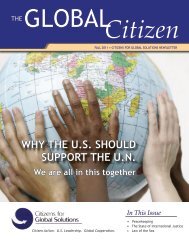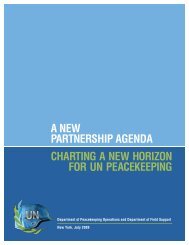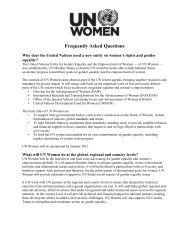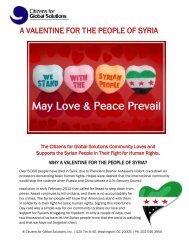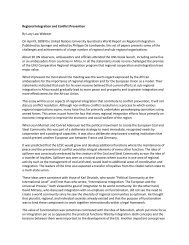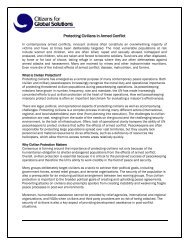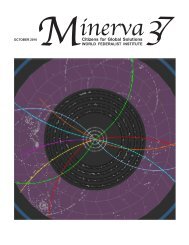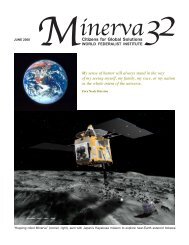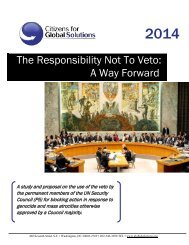Minerva, Fall 2011 - Citizens for Global Solutions
Minerva, Fall 2011 - Citizens for Global Solutions
Minerva, Fall 2011 - Citizens for Global Solutions
- No tags were found...
You also want an ePaper? Increase the reach of your titles
YUMPU automatically turns print PDFs into web optimized ePapers that Google loves.
This statement was provided to theUN Human Rights CouncilAdvisory Committee 7th Sessionby the following organizations:• Action Canada <strong>for</strong> Population and Development*• ARC International• Arcigay Italy• Asia Pacific Forum on Women, Law and Development(APWLD)*• Asia Pacific Transgender Networks (APTN)• Asian Forum <strong>for</strong> Human Rights and Development(FORUM-ASIA)*• Association <strong>for</strong> Women’s Rights in Development(AWID)* - International• Cairo Institute <strong>for</strong> Human Rights Studies (CIHRS)*• Canadian HIV/AIDS Legal Network*• Çavaria VZW - Belgium• Center <strong>for</strong> Legal and Social Studies (CELS) -Argentina• Center <strong>for</strong> Reproductive Rights* - International• Center <strong>for</strong> Women’s <strong>Global</strong> Leadership (CWGL)*- International• Coalition of African Lesbians - Pan-African• Cook Islands Women’s Counselling Centre• Development Alternatives with Women <strong>for</strong> a NewEra (DAWN)* - Philippines/ <strong>Global</strong>• Drodrolagi Movement - Fiji/Pacific• East and Horn of Africa Human Rights DefendersProject - Uganda• Equal Ground - Sri Lanka/South Asia• Forum de la Femme Ménagère (FORFEM) -Democratic Republic of Congo• Fundación Triángulo, por la Igualdad Social deLesbianas, Gais, Bisexuales y Trans -Spain/Europe• Gay Japan News• <strong>Global</strong> Action <strong>for</strong> Trans Equality (GATE)* -International• <strong>Global</strong> Alliance <strong>for</strong> LGBT Education (GALE)• Horizon Community Association - Rwanda• Human Rights Institute of South Africa(HURISA) South Africa/Africa• Human Rights Watch* - International• Idaho Committee (International Day AgainstHomophobia and Transphobia)• Inter-American Center <strong>for</strong> Human Rights - USA• International Alliance of Women• International Commission of Jurists (ICJ)*• International Federation <strong>for</strong> Human Rights (FIDH)*• International Gay and Lesbian Human RightsCommission (IGLHRC)* - USA• International Lesbian, Gay, Bisexual, Trans andIntersex Association (ILGA)* - Belgium• International Movement Against All Forms ofDiscrimination and Racism (IMADR)*• International Planned Parenthood Federation(IPPF)*• International Service <strong>for</strong> Human Rights (ISHR)*• International Women’s Health Coalition*• Ipas*• Italian Association <strong>for</strong> Women in Development*• Lesben-und Schwulenverband (LSVD)• LGBT Centre Mongolia• Moscow Helsinki Group• Mouvement pour les Libertés Individuelles -Burundi• Other Sheep Africa (OSA) - Kenya• Out-Right Namibia (ORN)Joint NGO Statement on Traditional Values4 March <strong>2011</strong>HRC Resolution 16/3, “Promoting human rights and fundamental freedoms through abetter understanding of traditional values of humankind”, stresses that “traditions shallnot be invoked to justify harmful practices violating universal human rights norms andstandards”, thereby acknowledging that traditions are sometimes invoked to justifyhuman rights violations.Concerns with a traditional values approach to human rights“Tradition” is frequently invoked to justify maintaining the status quo, ignoring thefact that cultures and social norms have always evolved and will continue to changewith time; by contrast, a human rights-based approach often requires changes to thestatus quo in order to ensure compliance with international standards. Simply becausea practice or belief has existed over a period of time or is practiced by a majority doesnot provide it with worth or validity. The obligation must always be to promote andprotect human rights, which may require that traditional values and practices evolve inorder to meet international standards.Many practices that fall under “tradition” are of long-standing origin, but others thatclaim to be “traditional” are in fact relatively recent. Tradition itself changes over timeand all cultures contain diverse and contradictory traditions. Most importantly, many“traditional values” may be inconsistent with international human rights, and “traditionalvalues” are frequently invoked to justify human rights violations. In previousdecades and centuries, mixed-race marriages, desegregation, women having the rightto work, to vote, to hold public office, or to own property would have been thought bymany to be inconsistent with “traditional values”.• Partners <strong>for</strong> Law in Development - India• Pembe Hayat LGBTT Solidarity Association -Turkey• Realizing Sexual and Reproductive Justice(RESURJ) - International• Salmmah Women’s Resource Center - Sudan• Sexuality Policy Watch - Brazil• Sexuality Policy Watch - Brazil/<strong>Global</strong>• Shustha Jibon - Bangladesh• The Federation <strong>for</strong> Women and Family Planning*- Poland• The Swedish Federation <strong>for</strong> Lesbian, Gay, Bisexualand Transgender Rights (RFSL)*• The Union of solidarity with political prisoners -Russia• Transgender and Intersex Africa - South Africa• United and Strong Inc. - Saint Lucia• Violence is Not Our Culture Campaign - <strong>Global</strong>• Women <strong>for</strong> Women’s Human Rights (WWHR) —New Ways* - Turkey/EU/Asia/MidEast• Women Human Rights Defenders InternationalCoalition (WHRD IC)• Women Living Under Muslim Laws - <strong>Global</strong>• Women’s Action <strong>for</strong> Change (WAC) - Fiji/Pacific• Women’s <strong>Global</strong> Network <strong>for</strong> ReproductiveRights (WGNRR) - Philippines• Women’s International League <strong>for</strong> Peace andFreedom** NGOs in consultative status with the UNEconomic and Social Council (ECOSOC)As many marginalised groups have experienced,“traditional values” are frequentlyinvoked to restrict access to humanrights <strong>for</strong> those segments of society who,from the conservative viewpoint or perspectiveof those in authority, challengethe mainstream or fall outside the dominantnorm. For example, a GovernmentMinister of State <strong>for</strong> Ethics and Integritydefended a Bill that would have includedthe death penalty <strong>for</strong> certain <strong>for</strong>ms ofconsensual same-sex conduct on the basisthat it was needed to maintain “traditionalChristian values as prescribed in theBible” (“Ugandan MPs debate Bill proposingdeath penalty <strong>for</strong> gay sex”, TimesOnline, December 18, 2009). UN SecretaryGeneral Ban Ki-moon recently notedthat “deeply-rooted cultural sensitivitiescan be aroused when we talk about sexualorientation” but underlined that “culturalconsiderations should not stand in theway of basic human rights”. 1[continued, next page]33 • <strong>Minerva</strong> #39 • November <strong>2011</strong>



